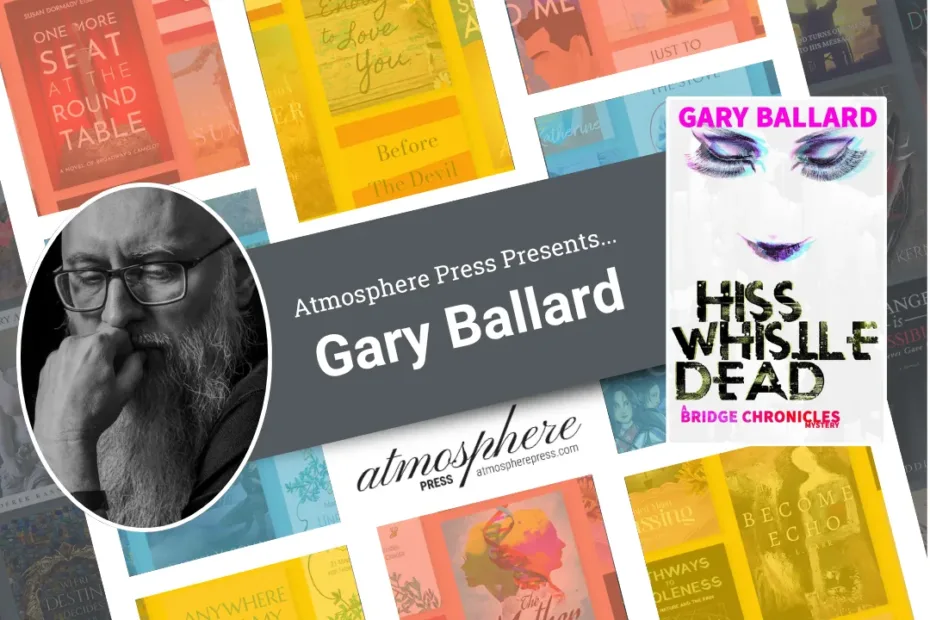An Interview with Gary Ballard

Born long ago in Meridian, Mississippi, Gary Ballard has always been too curious about the world. Beginning at the age of eleven, his writing journey has spanned decades, from those initial imitations of role-playing experiences and action movies to self-publishing over fourteen novels and novellas in multiple genres. Since 2007, he’s been writing a cyberpunk science-fiction series called The Bridge Chronicles, which contains six novels, a short story collection, and his latest, a standalone novel in-universe called Hiss Whistle Dead, starring the character of Shel, a GlobalNet Excavator. He has also published a six-part series of novellas reimagining the Cthulhu Mythos called The Stepping Stone Cycle. In between writing novels and his day job, he enjoys drawing, songwriting, music, and his latest obsession, rekindling his love of photographing the world.
What inspired you to start writing this book?
During the writing of a long and uncompleted historical novel, my mother’s dementia became terminal. I felt surrounded by this aura of impending death. In addition, I’d become intrigued by the idea of gender pronouns and the exploration of gender nonconformity. It occurred to me that I had the perfect character to explore both of these topics in Shel, a character I’d originally created for my Tales from the Bridge Chronicles, Vol. 1 short story collection. I would write a murder mystery of sorts, with Shel trying to determine how her younger brother had died.
Tell us the story of your book’s current title. Was it easy to find, or did it take forever?
The title was something that came fairly easily, as a bit of a joke. Lillian had died mysteriously, under circumstances related to use of the GlobalNet (think a futuristic version of the internet). The title is a mocking expression of the old sound a dial-up modem made when connecting to the internet – hiss, then a whistle, and then you’re dead.
If your book had a soundtrack, what are some songs that would be on it?
Oddly enough, I wrote and recorded a song called Who Am I? specifically because of the book. I even filmed a video of it, releasing it on my YouTube channel as part of the promotion. In addition, there is one sequence in the book where the character hears a song repeated, and that song is actually Save Your Tears by The Weeknd. I often listen to music while writing, with a very eclectic mix on tap. I think I moved between this and a lot of Tool or Nine Inch Nails while writing this novel.
What books are you reading (for research or comfort) as you continue the writing process?
I’ve been doing a lot of reading on the civil rights movement, specifically in my home state of Mississippi, as research for the historical novel I’ve been writing for years. I will alternate between something like a dissertation on the Black Power movement and something fictional like Thomas Hardy, cyberpunk fiction, Edith Wharton, or science fiction. In between, I’ve got other histories on subjects for which I’m not yet very knowledgeable. I like to dispel my own ignorance as much as I can.
Who/what made you want to write? Was there a particular person, or particular writers/works/art forms that influenced you?
I’ve always been a voracious reader, and I love the novel as an art form. Once I discovered I could write stories for myself, I don’t think there was ever going to be a time when I wasn’t writing or at least thinking about a new story with interesting characters. My early work was influenced by Stephen King, D&D, and Don Pendleton’s Executioner series, but as I grew up, I became engrossed by the beat writers Kerouac and Burroughs, and by cyberpunk authors like William Gibson, Bruce Sterling, and Neal Stephenson.
What advice would you give your past self at the start of your writing journey?
Though it’s cynical, maybe don’t expect to make a ton of money writing! It’s a very difficult process, and marketing your book is probably more difficult than the actual writing of the book. There’s no magic bullet to giving readers the permission to take a chance on your art.
What’s one thing you hope sticks with readers after they finish your book?
For this book in particular, there are a bunch of cautionary tales about the future, such as the dangers of generative AI, isolation, and mental health. I think the most important lesson could be the one that I follow the worst – pay attention to the whole person of the ones you love. It’s easy to lose track of who someone you’ve known for years, to trap their image in your mind as a snapshot frozen in amber, but remember that people evolve, they grow, they falter, and they aren’t the idealized versions of themselves. We want to remember them as perfect beings because we miss the best parts of them, but to truly honor their memory, we have to be willing to reconcile the parts that were imperfect.
Are you a writer, too? Submit your manuscript to Atmosphere Press.

Atmosphere Press is a selective hybrid publisher founded in 2015 on the principles of Honesty, Transparency, Professionalism, Kindness, and Making Your Book Awesome. Our books have won dozens of awards and sold tens of thousands of copies. If you’re interested in learning more, or seeking publication for your own work, please explore the links below.
